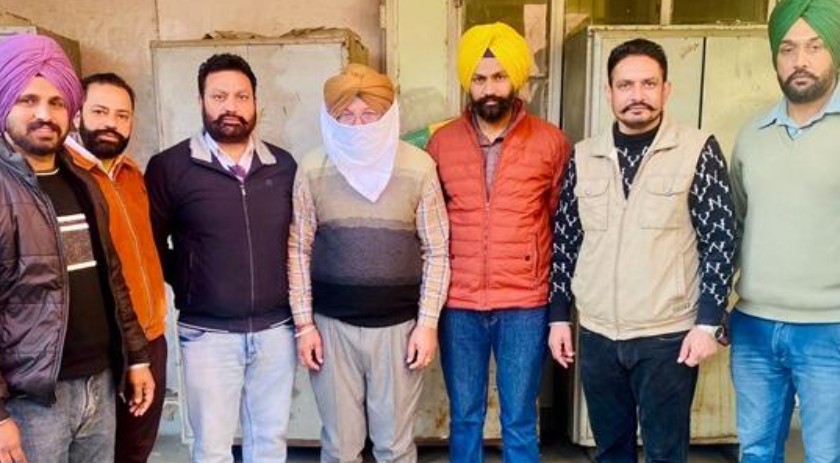In a significant move that once again underscores the Punjab government’s commitment to maintaining transparency and rooting out corruption from administrative systems, the Vigilance Bureau arrested a Mandi Supervisor in the act of accepting a bribe of ₹7,000. This latest action reflects the state’s zero-tolerance policy toward corrupt practices and reiterates its broader agenda of ensuring accountability at all levels of governance.
The accused, a government employee entrusted with overseeing operations at a local grain market (Mandi), was caught red-handed while accepting the bribe from a farmer. According to the Vigilance Bureau, the complainant had approached the Supervisor for services that were part of the latter’s official duties. However, instead of offering assistance as expected in a fair administrative setup, the official allegedly demanded money to process documents and facilitate the smooth procurement of crops.
For years, farmers in Punjab have raised concerns over unethical demands from lower-level officials during procurement seasons. Bribery, delays in payments, and the manipulation of crop quality grades have been some of the challenges that cultivators routinely report. While successive administrations have promised reforms, concrete and visible actions like this arrest serve as a major confidence booster for the agricultural community, which forms the backbone of Punjab’s economy.
The farmer, disillusioned by the demand, decided to take a bold step and approached the Vigilance Bureau with a formal complaint. Understanding the gravity of the situation and with enough preliminary evidence at hand, the Bureau swung into action. A trap was laid under the supervision of senior vigilance officials. As the bribe money exchanged hands, the Mandi Supervisor was caught in the act and immediately taken into custody.

Following the arrest, the Vigilance Bureau conducted searches at the official’s home and office to look for further incriminating documents, cash, and potential evidence of disproportionate assets. The agency has been increasingly focusing on such cases to build a strong deterrent against corruption, especially in departments and sectors with direct public interaction such as agriculture, land revenue, transport, and health.
The arrested Supervisor will be produced before a competent court, and a detailed investigation will follow. Legal proceedings under the Prevention of Corruption Act have been initiated. As part of the Bureau’s standard procedure, further inquiries will determine whether the accused had a pattern of such practices or whether this was an isolated incident. The Bureau also aims to identify any accomplices who may have been operating in tandem with the Supervisor.
Senior officials of the Vigilance Bureau noted that the case is not just about punishing an individual but part of a wider effort to clean up systems and instill faith among citizens. They emphasized that government services are meant to be accessible without fear or monetary coercion, and this arrest should serve as a reminder to public servants across departments that misconduct will not be tolerated.
The state’s Chief Minister, who has consistently vocalized his vision of a transparent and accountable government, appreciated the Bureau’s swift action. He also encouraged citizens to come forward whenever they face undue demands or harassment from government officials. According to him, citizens should not feel intimidated or helpless and must be empowered to speak up, assured that the law and the administration will protect their rights.
The case also underscores the critical role of anti-corruption awareness and the importance of citizen participation in building a just and clean administrative system. Experts believe that robust systems like grievance redressal mechanisms, digitized public service delivery, and real-time monitoring of key operations in Mandis and public offices can help reduce opportunities for corruption.
Furthermore, the government has been taking proactive steps to enhance the effectiveness of its anti-corruption infrastructure. Mobile apps and helplines have been launched where people can anonymously report cases of bribery and corruption. These platforms are increasingly being used by common citizens to alert the Vigilance Bureau, demonstrating growing public trust in these mechanisms.
Incidents like this also bring into sharp focus the need for systemic reform and training within the bureaucratic framework. Public service officials need not only to be held accountable but also be sensitized to their roles as facilitators and protectors of citizen rights. Training programs aimed at strengthening ethical behavior and procedural transparency are now being emphasized more strongly across government departments.
The arrest has stirred conversations among various stakeholders, from political leaders to civil society organizations. Farmer unions, in particular, have welcomed the move, calling it a “victory for the common man.” They expressed hope that this step would be followed by similar action in other procurement centers where corrupt practices are alleged to be rampant. It is essential, they argue, that farmers—who are already battling issues like rising input costs, erratic weather, and fluctuating market prices—not be further burdened by corruption.
On social media and local forums, citizens hailed the arrest as a sign of changing times and a strong stance by the state government. Many have shared their own experiences of facing such challenges and expressed hope that the Vigilance Bureau will act with the same urgency in similar future cases.
The road to a corruption-free governance model is long and complex, but every meaningful action builds momentum in that direction. The arrest of the Mandi Supervisor for accepting a ₹7,000 bribe might appear minor when compared to larger financial scams, but in reality, it touches the lives of ordinary citizens in a deeply personal and practical way. Such actions restore faith, not only in the law enforcement machinery but also in the ideals of governance envisioned in a democracy.
As the investigation proceeds and the judicial process takes its course, this case will be closely watched by both the public and policymakers. If handled with the seriousness it deserves, it can set a precedent and inspire more people to take a stand against corruption in everyday life.
Ultimately, the success of any anti-corruption initiative lies not just in punishment, but in prevention. And for that, sustained vigilance, technological interventions, and above all, an engaged and courageous citizenry are key. Punjab seems to be moving in that direction—step by determined step.


